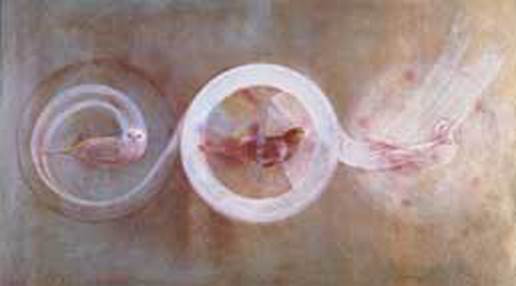
CHRISTIAN DISCIPLINES
God can be loved but He cannot be thought. He can be grasped by love
but never by concepts. For the spiritual seeker, this means less thinking and more loving.
There are two clear-cut steps on the way to enlightened contemplation. The first is the rejection of all thoughts about “what I am” and “what God is” in order to be conscious only that I am and that God is. This is an “existential prayer” because of its abandonment of all essences or modes of being. However, this is only the first step; the second step is the rejection of all thought and feeling of “my own being” so as to be conscious only of the being of God.
Faith is knowledge that cannot be rationally demonstrated. If such knowledge cannot be rationally demonstrated, then faith is a supernatural relationship through which, in an unknowable and unverifiable manner, we are united with God in a union which is beyond explanation.
Christ said, “Seek first the kingdom of God and His righteousness” (Matt. 6:33). That is, seek the knowledge of truth before all things, and seek the appropriate methods of training to attain it. In saying this, Christ shows clearly that believers must seek only divine knowledge and the virtue which adorns it with corresponding actions. There are many things of which the believer has need for in order to attain knowledge of God and virtue: transformation of one’s passions, patient acceptance of trials, the inner principles of virtues, the practice of spiritual fortitude, the uprooting of the body’s predilection for sensual gratification, the breaking of the senses’ attachment to sensible objects and the utter withdrawal of the ego-personality from worldly pleasures.
There are countless other things which help us to reject sin and ignorance and to attain knowledge, virtue and understanding. It was surely because of this that Christ said, “Whatever you ask for in prayer, believing, you will receive” (Matt. 21:22), stating simply that the devout must seek and ask with understanding and faith for all these things, and for these alone, which lead to virtue and knowledge of God. For all these things are profitable, and unquestionably, the Lord gives them to those who ask.
Those, who for the sake of faith alone, that is, for the sake of direct union with God, seek all the things that contribute to this union, will unquestionably receive them. However, those who seek either these things which have been mentioned, or other things without
this motive, will not receive them. For they have no faith, but are like the unbelievers who use divine things to boost their own glory.
Those who purge their will from the corruption of sin destroy the corrupting activity that causes corruption. For when their free will is itself free from corruption, it prevents the nature-body from being corrupted by impure forces and keeps it incorrupt through the providential grace of the Spirit within it. Since the principles of nature and of grace are not one and the same, we should not be surprised if certain of the saints sometimes resisted the passions and sometimes succumbed to them; for the miracle of resistance is due to grace, while the passions belong to nature. Those who keep in mind the way of the saints by imitating them not only shakes off the deadly temptations of the passions, but also takes up the life of the virtues.
Virtue exists for the sake of truth, but truth does not exist for the sake of virtue. Those who practice virtues for the sake of truth are not wounded by the delusions of self-esteem; but those who pursue truth for the sake of virtue harbor the conceit which self-esteem generates. Truth is divine knowledge and virtue struggles for truth on the part of those who desire it.
Those who endure the labors of virtues for the sake of such knowledge are not vainglorious because they know truth cannot be grasped naturally through human effort. However, those who expect to attain knowledge by means of the struggles they make for the sake of virtue invariably suffer from self-esteem issues because they imagine that they have gained the victor’s crown before they have sweated for it. They do not know that labors exist for the sake of crowns, but crowns do not exist for the sake of labors. For by nature every spiritual method ceases to be practiced once the purpose for which it was intended has been achieved.
The human has three powers: conscious-intelligence, desire and an inflammatory nature. With our conscious-intelligence we direct our search for knowledge; with our desire we long for that supernal goodness which is the object of our search; and with our fiery nature we fight to attain our goal. With these powers those who love God cleave to the divine principle of virtue and spiritual knowledge. Searching with the first power, desiring with the second, and fighting by means of the third, they receive incorruptible nourishment, enriching the conscious-self with the spiritual knowledge of divinely created beings.

When the Logos of God became human, He filled human nature once more with the spiritual knowledge that it had lost in Eden; and steeling it against changefulness, He deified it, not in its essential nature, but in its quality. He stamped it completely with His own Spirit, as if adding wine to water so as to give the water the quality of wine; for Christ became truly human so that by grace He made us gods.
When God created human nature, at the same time as He gave it being and free will, He joined to it the capacity for carrying out the duties laid upon it. This “capacity” means that God implanted the impulse in human nature on the level of both being and free will; on the level of being, so that humans have the power to achieve the virtues; and on the level of free will, so that humans may use this power in the right way.
There is a great and unutterable difference between the Tree of Life and the one which is not the tree of life. This is clear simply from the fact that the one is called the Tree of Life while the other is merely called the tree of the knowledge of good and evil, or rather, the tree of knowledge regarding duality in the material world. Unquestionably, the Tree of Life is productive of life; whereas, the tree of knowledge about duality is not productive of life; it is obviously productive of death, for only death is the opposite of life.
The Tree of Life, which is the archetypal, spiritual matrix of the Adamic human body, when understood as symbolizing wisdom, greatly differs from the tree of the knowledge of good and evil which represents the conceptualizing ego-mind; the latter is incapable of comprehending wisdom. Wisdom is characterized as knowledge applied to life, whereas, the state which is opposite to wisdom is lacking in such intelligence since it is attached to worldly sensations.
Since humans came into life composed of noetic intelligence in a sentient body, one interpretation of the Tree of Life could be that the “heart-soul” is the seat of wisdom. The tree of the knowledge of good and evil would then be the experience of the sentient body and its elemental sensations, which is clearly the seat of mindless sensual impulses. Humans received the divine commandment not to involve themselves actively and experientially with these sensual impulses; but they did not keep the commandment.
Both trees in Scripture symbolize intelligence, the body and the senses, thus, our conscious-self has the power to discriminate between the spiritual and the sensible, between the eternal and the transitory. Therefore, the discriminatory power of reason persuades the conscience to cleave to the first and to transcend the second. The sentient body, through feeling and desire in the conscious-self has the power to discriminate between pleasure and pain so desire persuades feeling to embrace pleasure and reject pain.
If humans only exercise sensory discrimination between pain and pleasure in the body, then they only eat from the tree of the knowledge of good and evil, that is to say, they succumb to the mindless impulses of the body which pertain to the senses. Those who possess only the body’s power of discrimination embrace pleasure as something good and avoid pain as something evil.
However, if people exercise the noetic discrimination which distinguishes between the eternal and the transitory, and keep the divine commandment, they eat from the Tree of Life; they partake from the wisdom which pertains to their heart. They exercise only the power of discrimination associated with the spiritual consciousness, which makes them cleave to the glory of what is eternal as something good, and avoid the corruption of what is transitory as something evil. Goodness, so far as our spiritual nature is concerned, is a dispassionate predilection of the spirit; whereas, evil is an impassioned and persistent attachment of the nature-body to sensual pleasures.
Goodness, so far as the senses are concerned, is the impassioned activity of the body under the stimulus of pleasure; and evil is the state destitute of such activity. They who persuade their conscience to regard the evil they do as good, by nature, reaches out with their moral faculty, as with a hand, and grasps the Tree of Life in a reprehensible manner; for they think what is thoroughly evil is by nature immortal. Therefore God, who has implanted in the human conscience a natural hatred of evil, cuts them off from life, for they have now become evil in their will and in their intentions. God acts in this way so that when a human does wrong they cannot persuade their own conscience that what is thoroughly evil is good by nature.
It is the devil’s practice to maliciously confound the forms and shapes of sensible things with our conceptual images of them. Through these illusory forms and shapes are generated passions for the outward aspects of visible things, and our perception is halted at the level of what pertains to sense-perception; thus, the conscious-self cannot raise itself to the realm of spiritual realities. In this way, the devil despoils the soul and drags it down into the turmoil of the passions.
It is said that those who do not first reintegrate themselves with their true Self by rejecting those passions which are contrary to nature will not be reintegrated with the Creator of their being, by acquiring supernatural blessings through grace. For those who would truly unite with God must first detach and separate themselves mentally from created things.

Human intelligence has by nature the capacity to receive spiritual knowledge of corporeal and incorporeal things; but by grace alone does it receive revelations of the Holy Trinity. While believing that the Trinity exists, the human intellect can never presume to grasp what the Trinity is in Its essence, in the way that this is known to the divine Noetic Intelligence. The person without spiritual knowledge is completely ignorant of the way in which sin is purged by virtue.
Those who love falsehood and deceit are handed over to be harrowed by it, so that by suffering they may come to know what it is they willfully pursued, and may learn by experience that they mistakenly embraced death instead of life.
God has knowledge only of what is good, because He is in essence the nature and the knowledge of what is good. He is ignorant of evil because He has no capacity for evil. Only of those things for which by nature He possesses the capacity, does He also possess the essential knowledge.
Those fully endowed by the Spirit with spiritual knowledge and virtue are able, through preaching and instruction, to make the hearts of others receptive to true devotion and faith, withdrawing their disposition and capacity from its preoccupation with corruptible nature and directing it towards the actualization of supernatural and incorruptible blessings.
Compared with the righteousness of the age to come, all earthly righteousness fulfills the role of a mirror which reflects the image of archetypal realities, not the realities themselves as they subsist in their true and universal nature. And compared with knowledge there, all spiritual knowledge in this world is an indistinct image which contains a reflection of the truth but not the truth itself as it is destined to be revealed. What is divine consists in virtue and spiritual knowledge, and the mirror displays the archetypes of virtue and the indistinct image reveals the archetypes of spiritual knowledge.
Those who conform their life to God’s will through practice of the virtues transpose their consciousness to the realm of noetic realities by means of contemplation. By so doing, they place themselves utterly beyond the reach of everything which seeks to entrap them, and so they are not attracted through sensory images towards the death that lies in the passions.
Through the diligent practice of the virtues the conscious-self is raised towards the noetic intelligence. Through contemplation this higher-intelligence leads toward wisdom those who aspire to spiritual knowledge. Passion, which is contrary to noetic intelligence, induces those who neglect the commandments to descend to the realm of the senses and the result of this is the attachment of the nature-body to sensual pleasures.
Virtue is a stable and utterly dispassionate state of righteousness. Nothing stands opposed to it, for it bears the stamp of God, and there is nothing contrary to that. God is the cause of the virtues; and a living knowledge of God is realized when those who have truly recognized God change their inner state so that it conforms more closely to the Spirit.
If Creative Intelligence has determined the origin of each created being, no such being by nature either goes beyond itself or falls short of itself. Thus, the norm for created beings is their desire and knowledge of their Cause and their measure is the active imitation of their Cause in so far as this is within their scope. For if created beings are carried in their desire beyond the proper norm and measure, this makes their life fruitless, since they do not find their goal in God; and it is in God that the desire of all things finds its repose, receiving the enjoyment of Him as its self-subsistent consummation. When created beings in their desire fall short of the norm and measure, their life is again fruitless, since they find their goal not in God but in the realm of the senses, in which there is a pleasurable, but illusory enjoyment of the passions.
Conceit is a truly accursed passion. It is a combination of two vices, pride and self-esteem. Pride denies the cause of virtue and nature, while self-esteem adulterates nature and virtue itself. A proud man does nothing that accords with God’s will, and a man full of self-esteem achieves nothing that accords with nature.
The mark of pride is to deny that God is the author of virtue and nature; the mark of self-esteem is to make divisions in nature and so to treat some things as worthless. Conceit is their natural offspring, being an evil state composed of a voluntary denial of God and ignorance of the equal dignity that things possess by nature.
When the conscious-self is not dominated by the senses, the natural law persuades all humans to instinctively embrace what is akin to themselves and of the same species, since nature itself teaches us to help those in need. In addition, the natural law persuades everyone to wish for everybody else whatever they consider agreeable when done to them by others. This is what the Jesus Christ teaches when He says, “Treat others as you want them to treat you.” (Luke 6:31)

In Psalm 23, “The Lord is my shepherd, I shall not want…” this means we should strive to be needless and want for nothing. In reality, needlessness is a state of mind in which we realize that God will provide for our needs; and those needs are the “spiritual food” we experience within our heart and soul when we are properly attuned to Christ and the Holy Spirit. We live in a world of abundance and can have whatever we want, whenever we want it; and this distorts our vision of the world making it seem as if abundance is superior to God-Realization, as if the exterior world is superior to our internal reality, but it isn’t. In time, material things that once excited us become meaningless and turn to dust; but the light, love and peace we feel within our heart and soul are eternal life that never stops radiating.
“He makes me to lie down in green pastures…” lying down in green pastures represents the study and practice of the virtues; “He leads me beside the still waters…” means that He is present with us as we learn to control the lower emotions in our psychic nature, and to transform these lower psychic energies into the still waters of the higher psychic: the “waters of refreshment” or spiritual knowledge which helps us to “restore our soul.” (See: Stages 2 & 3 Meditation)
“He leads me in the path of righteousness for His names sake…” The righteousness of purity, virtues and spiritual knowledge fortify us so we can “walk through the valley of the shadow of death and fear no evil for thou art with me…” the shadow of death is the human life experience and we have been lead in the path of righteousness, the Way of Life through Christ Jesus, so we can rise above this “earthly shadow of death” and fear no evil.
“Thy rod and thy staff have comforted me…” The rod signifies God’s judgment and the staff His providence and by these we have been comforted. “You have prepared a table before me in the presence of my enemies…” In this passage, the table stands for the practice of the virtues, for this has been prepared for us by Christ to use against those who afflict us. The “oil” anoints the higher spiritual consciousness contemplating the realization of the divinely created Self within. (See: Stage 4 Meditation)
The “cup” of God is the knowledge of God; His “mercy” is His divine Logos. For through His incarnation the Logos pursues us “all the days of our life” until He overtakes all those who are to be saved, as He did in the case of Paul (Phil.3:12). “And I shall dwell in the house of the Lord forever…” The house is the kingdom in which all the saints will dwell and the “length of days” means eternal life.
We all must be mindful that when we pray the Lord’s Prayer, or any other prayer for that matter, there are dark forces, some call demons, which are very envious of us when we pray and use every kind of trick to thwart our purpose. They use our memory to stir up thoughts of various things and our flesh to arouse the passions, in order to obstruct our way of ascent to God. When after many attempts these dark forces fail to hinder the prayer of the righteous ones, they slacken their efforts a little, but at the first opportunity, they provoke who they can to anger, and so destroy the good effects of the prayer, or else they excite us with senseless pleasures which degrades our intelligence.
Evil does not exist by nature, nor is anyone naturally evil, for God has never made anything that was not good. When in the desire of their heart, someone conceives and gives form to what in reality has no existence, then what they desire begins to exist; by willfully repeating this pattern, people become evil. We should therefore turn our attention away from the inclination to evil and concentrate it on the remembrance of God; for good, which exists by nature, is more powerful than our inclination to evil. The one has existence while the other has not, except when we give it existence through our thoughts and actions.
All humans are made in God's image; but to be in His likeness is granted only to those who through great love have brought their own freedom into subjection to God. For only when we do not belong to ourselves do we become like Him who through love has reconciled us to Himself. No one achieves this unless they persuade their soul not to be distracted by the false glitter and desires of this life.
With God's help we can become good also through careful attention to our way of life. We can transform ourselves into what we are not when our soul, by devoting its attention to true delight, unites itself to God, in so far as our spiritualized faith desires this. All spiritual contemplation should be governed by faith, hope and love, but most of all by love. The first two teach us to be detached from visible delights, but love unites the soul with the excellence of God, searching out the Invisible by means of spiritual perception.
Let Your L’il Light Shine!


SpiritualChristian.com

*
* *

